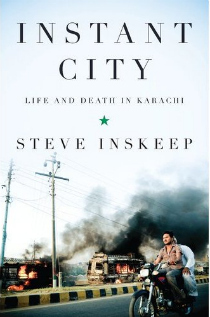What I didn't know about Karachi: Insights into the future of Pakistan

I've just finished
reading an advance copy of Steve Inskeep's Instant
City: Life and Death in Karachi, which comes out this fall. I don't
much like the title, but I really enjoyed the book. I feel like I have a much
better understanding of Pakistani politics now.
He takes us through
a terrific journey through a sprawling, terrifying city that might be the most
important place in the world right now. To my surprise, a lot of the book is
about fights over land development, which gets wrapped up in ethnic and
political tensions. Imagine Donald Trump as a Pashtun warlord/developer. One of
the most striking sections of the book is about a man who protested the
misuse/theft of park land, and the day after giving a press conference was shot
in the head and killed. His successor in the save-the-park movement also was
murdered.
Here are some of the
other things I learned about Karachi and Pakistan.
--The military is
the single largest property owner in the city, and control of land (not
necessarily ownership) is the biggest game in town.
--At the time of the
Pakistani independence, Karachi was majority Hindu. That changed quickly.
--Pakistan's
parliament building and the Kennedy Center in Washington, D.C. had the same
architect. (One more Pakistani grievance against America!)
--The city's police
answer not to the mayor but to the provincial government.
--Most of the city's violence is not related
to Islamic extremism.
--Karachi has 70,000
Boy Scouts
--Muhammad Ali
Jinnah, the founder of Pakistan, owned 200 fine English suits. Also, he was
Shiite, as was Zulfikar Ali Bhutto, the most important leader of Pakistan since
Jinnah.
--You always see
news photographs of torched busses when ethnic violence breaks out because the
bus business is seen as dominated by Pushtuns, and their busses are attacked in
retaliation for the burning of shops.
If this book has a
warning for the rest of the world, it is this: "When a growing city maintained
public services and protected the public interest, then private interests had a
chance to prosper. But when the public interest was neglected and the environment
was debased, then private interests, too, would be steadily and inexorably
destroyed."
Thomas E. Ricks's Blog
- Thomas E. Ricks's profile
- 436 followers



